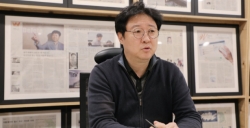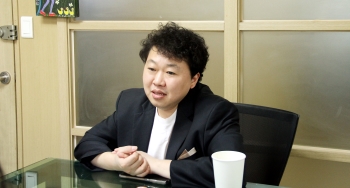The COVID-19 pandemic resulted in further development of online markets, as numerous activities transitioned to internet platforms. In response, the Ministry of Culture, Sports and Tourism has decided to completely revise its copyright policy. Negotiations started in September for the purpose of protecting privacy and copyright. The significance of this amendment is that the words and pictures uploaded online are considered to have greater magnitude due to enhanced permanence. This means that internet users should be heedful of what they post online by following the amended copyright law. Amid the overwhelming amount of information published on the internet, it has become equally important to consider the right to erase unwanted information posted online. Those who erase unwanted content online are dubbed digital undertakers. Ewha Voice interviewed two digital undertakers who founded companies to remove unwanted posts online at their clients’ request.
Digital undertakers: Deleting the old and making way for the new

Santa Cruise Company used to be a modeling agency focused on casting models and celebrities for advertisements. When an elementary student they casted was tormented by malicious comments online, they took their first step into the digital undertaking business in 2008 to focus on erasing digital information.
Santa Cruise Company is now an official digital undertaking company, specializing in using big data to remove digital information for clients. Ewha Voice interviewed Kim Ho-jin, the CEO of Santa Cruise Company.
Kim stated that advancements in technology have led to increasingly diverse crimes that affect a significant number of people. From March 2019 to February 2020, a total of 4,603 individuals requested help from Santa Cruise Company, including celebrities and teenagers.
“Phone scams or sexual harassment using hidden cameras have now expanded into pyramid schemes,” Kim said. “Victims are blackmailed to become perpetrators, involving more people in the crime, which ultimately results in larger amounts of digital data in need of deletion.”
He stated that completely eradicating digital information was also difficult, giving the example of digital sex crimes. There are endless cases where videos of sexual intercourse between former couples find their way onto online communities. Even after these videos are deleted, if they are sought after by online users and are downloaded and reuploaded, there is no way to erase them permanently. In these cases, close monitoring is needed so related digital information can be deleted the moment they are uploaded.
Kim emphasized the importance of disconnecting the past from the present.
“Everyone makes mistakes,” Kim said. “But this should not be the cause of your current demise. What is in the past should stay in the past, but because of digital footprints, people are being tormented today, which gives no hope for their future. We commit to this job to give everyone their rightful hope for the future.”
Kim stressed that privatizing information is paramount. He said that there are seven pieces of information that should be kept private. Those are your school, major, name, email address, resident registration number, face, and picture in a specific group.
“There are constant cases of banks leaking private information,” Kim said. “The information provided by banks and the seven pieces of information online makes it extremely easy to have access to nearly all of your personal information. Therefore, phone scams occur more continuously, intricately, and meticulously. It is all based on your accumulated information.”
He said although it is impossible to totally disconnect oneself from the digital world, it is safer not to upload any pictures on social media. A shocking digital undertaking request he received was from a middle school student who had her face photoshopped onto a naked body. When she rejected a boy who asked her out, he got revenge on her by uploading these photoshopped pictures. As he knew her school, name, phone number, and email address, it gave him sufficient credibility when he called her sexually degrading names.
Kim then mentioned that all digital undertakers must work for the public good. As he works to delete people’s past, he is careful not to leave criminals unpunished. Likewise, Santa Cruise Company is not receiving requests from perpetrators involved in the Nth Room Case, who engaged in blackmailing, sexually exploiting, and harassing women and children.
Kim concluded that Santa Cruise Company aims to create a safe and positive digital world. As people of all ages and genders leave their digital footprints, it is crucial to erase old and unnecessary information to make way for the new.
“It is unfortunate that a lot of people think it is a waste of time and money to invest in deleting their digital information,” Kim said. “In fact, 10 percent of all ordinary people’s digital information is unnecessary and needs to be deleted. Everyone should constantly seek out their own information on search engines, view the results, and request that unwanted information be deleted.”
The right to be forgotten before the right to know

On Nov. 10, Ewha Voice sat down with Park Il-su, a digital undertaker and CEO of two digital undertaking companies: Digital Care and Women Care. Park, who specializes in deleting online postings, shared his insights on how the right to be forgotten can be protected despite the highly developed internet-based social media environment.
Digital Care was established in 2018 as a means to help those who suffer because of unwanted online postings of their past that are accessible to all users. While managing Digital Care, Park noticed that the majority of his clients were women and felt the need to create an exclusive service only for women. A year later, he founded Women Care.

Park emphasized that, among the requests received, the company has a set of criteria that marks the limit between acceptance and rejection. This also highlights the company’s philosophy.
“We do not accept requests that can harm someone else,” Park said. “For example, if a company asks us to erase certain information that compliments a rival company, we reject those requests. There are also people who contact us and inform us only about the damage they are suffering from. When we accept the request and start investigating the problem, we get to know every detail, even the parts that the client did not tell us. If the facts that we discover are major setbacks in the deleting process, then we refund and stop.”
The digital deleting process consists of several steps. The company consults with the client about the item that is to be deleted and receives the client’s ID card and power of attorney. This is the process of analyzing the content, determining how to proceed, and requesting deletion from the site. In the case of photos and videos that are difficult to search for using keywords, original works such as audio, video, and image files are found and deleted instead.
Park stated that the biggest difficulty he faces in his work is the lack of communication with the client. Since the deleting process requires the client’s personal information, many clients stop contacting him when he asks for their ID card or their personal information.
When asked about the dilemma he faces between the right to be forgotten and the right to know, he asserted that the right to be forgotten is more crucial. One’s personal information should only be used in accordance with one’s intention, whether the individual is a celebrity or not. Thus, if there are any online records that the individual does not want others to see, then they should be deleted according to the right to be forgotten.
Although there is a center that supports the victims of digital sexual crimes operated by the Women’s Human Rights Institute of Korea, the waiting time keeps increasing due to increased demand. However, since Women Care deletes within a few days, there are many clients who have waited in line for the center and then come to Women Care. Park stated that Women Care’s strength lies in the speed of the deleting process.
Park commented that his final goal is to build a website for protecting the records of the dead. He hopes to allow the family of the deceased to log into the website anytime to reminisce about their family members without worrying about the information being leaked and used outside of the webpage.

